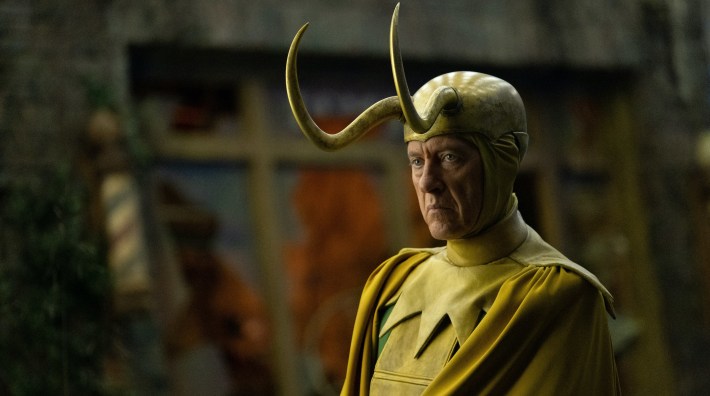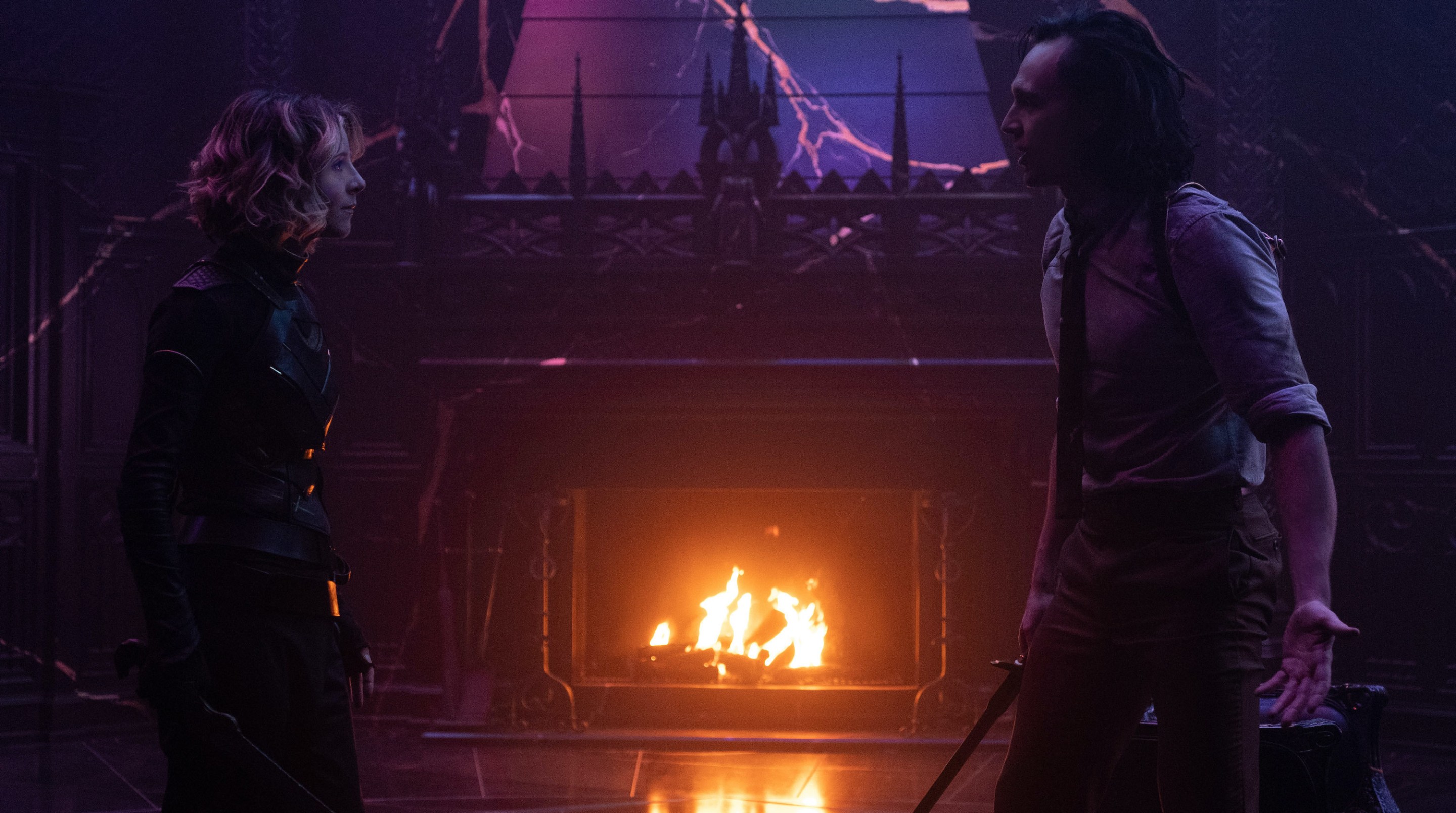Loki shouldn't have worked. The third entry into the new Marvel Cinematic TV Show Multiverse Of Madness And Guest Stars had all the trappings of a bad time: It dealt with time travel, it undermined the original Loki's death in Avengers: Infinity War, and it promised to ponder the question of free will, something that no superhero movie or show is ever going to do correctly. If Loki had stuck to the same beats as the other MCU properties, it would have likely failed as hard as The Falcon and the Winter Soldier did, or been as much of a disappointment as the ending of WandaVision was. Instead, though, Loki did something very few Marvel entries had done in the past: It threw up a middle finger to the Marvel formula and made something new. Well, it did that for five out of its six episodes, at least.
Thirteen years into the Marvel Cinematic Universe, there's a suffocating formula for most, if not all, of its properties. If you've seen any of the films in the franchise, you know how it goes: There are quips galore, and a lot of "well, THAT just happened"-type humor. There are moments of milquetoast heroism. And, almost always, there is a big fight at the end, usually rendered with the aid of CGI, to properly reach the universe-shattering stakes that seemingly every film or TV show has to have.
[Spoilers from here on out for the entire series; don't say I didn't warn you.]
Loki had quips, to be sure; it's probably the second-funniest installment in the MCU after Thor: Ragnarok. But there was no heroism to be found here. This version of Loki does evolve from the familiar villain/sometimes-antihero of movies past into a full-on protagonist good guy by the end, but his heroism gets him nowhere; he loses once again in a show that is obsessed with the concept of Loki always losing. Best of all, there's no big CGI fight anywhere to be found in Loki. The closest we got to that was the ending of Episode 5, as Loki and his female Variant Sylvie—more on her in a bit—tried to mind control, but not kill, a giant cloud monster ... thing. The finale of the show, where the big confrontation could have been expected to occur, swerves incredibly hard to the left, and is instead one long exposition dump by a previously unseen character.
The main reason this scene, which on paper sounds excruciating, worked so well is the presence of Jonathan Majors. The Lovecraft Country and The Last Black Man In San Francisco star shows up as He Who Remains, the show's hidden villain who had previously stayed in the shadows as the ruler of the Time Variance Authority, a bureaucracy whose only job is to make sure the Sacred Timeline doesn't get borked beyond relief. Essentially, they are time-cops, and He Who Remains is the captain of the force. The context and intricate time travel rules don't really matter, though, because Majors does such a good job of breaking down six episodes of confusion into one simple, binary choice: Spare his life to keep the status quo, or kill him to unleash the next big MCU villain. It's probably easy to figure out what happens from here.
He Who Remains is seemingly a version of Kang the Conqueror, a comic book time-traveling Big Bad who is already confirmed to be in the third Ant-Man movie. Majors will play that iteration of the character as well, and I for one can't wait for it after his very long monologue in Loki. Majors plays He Who Remains as a loony, personable outcast, fitting his role as the solitary force behind everything that has ever happened in the MCU. That's a big thing to introduce in about 40 minutes of a TV show, and it doesn't always work perfectly well (the explanation of the ridiculously named Multiversal War is just a bit too much exposition at all once), but if you are planning a massive info dump that will reverberate through, like, 15 different movies and shows, there are worse ways to do it than with a fantastic actor at the helm.
Great acting has been the main strength of Loki as a whole, and what set it apart from other MCU properties, which are not really known for their acting, aside from a few notable exceptions. The best Marvel performances tend to come from actors who are cast in one-off villain roles, and that's not a coincidence. Marvel generally writes its heroes close to the house style, and they all somewhat blend together. The villains, on the other hand, get a lot more room to chew the scenery and deliver memorable moments. That's why Loki works so well. Everyone involved is, in some form or another, a bad guy, and they all commit to their roles in a way that stands out from everything else.
It helps the show that Tom Hiddleston is the MCU actor who best understands and engages with the ridiculousness of the franchise. At the start of the season, he is Avengers-era Loki, brash and cocky and more than a little bit of a dick. By the finale, he is completely changed, and Hiddleston sells the effects that a series full of time-traveling and consciousness-breaking revelations have had on the character. For her part, Sophia Di Martino plays the role of Sylvie well, at times a menacing mastermind and at others a petulant loose cannon not unlike the original Loki. Though their burgeoning romance is weird—they are, essentially, clones of one another—it never feels forced; these are two bad people who find someone who is similar enough to be worthy of love, and both actors get that and play it accordingly.
The supporting cast also shines. I already talked about Majors's big scene, but Owen Wilson is as charming as ever in Loki, using his usual "gee whiz!" persona to explain time travel and Nexus events and friendship. He's the best part of the show, and the worst episode—Episode 3, a digression into an apocalypse that ends up not mattering a whole lot—suffers for his complete absence. Gugu Mbatha-Raw, previously of Black Mirror standout episode "San Junipero," gets less to do as Judge Renslayer, but she does a great job of making her motives as the TVA caretaker unclear, even through the finale that leaves her fate in a cliffhanger. Wunmi Mosaku, also of Lovecraft Country, gives the generically named Hunter B-15 a quiet rage that pops off the screen whenever she's around, particularly after a mid-season moment of revelation. And hey! Richard E. Grant shows up as Classic Loki to eat everyone's lunch in Episode 5; that was great.

Loki succeeds because it feels so little like a Marvel show. It has more in common with Dr. Who and The Wizard of Oz and even The Matrix: Reloaded—the big He Who Remains scene in the finale is essentially the Architect scene but less pretentious—than it does the MCU. Unfortunately, it is still part of that pop culture-consuming behemoth, and that's where the show's biggest failure comes in. Despite telling a pretty self-contained story, starring a titular character who has been dead in the main MCU chronology since Infinity War, Loki is still part and parcel to the franchise, and so must set up future mysteries.
The Kang the Conqueror reveal in the last moments landed like a wallop to the head for me, because it's exactly the type of MCU franchise-building that reminds viewers that nothing matters more than the mothership. It's a similar problem to the one WandaVision had at the end, though, at the very least, Loki avoided having Hiddleston and Di Martino fly around while shooting CGI blasts at each other. Their quick battle was more of a character moment than an action scene, but that fit the show's modus operandi well.
The questions raised by the show—about free will, about what we owe ourselves, and about the contrast between crushing order or, as Majors puts it, "cataclysmic chaos"—are all shelved, for now, in favor of giving Marvel fans something to obsess over as we move into Phase Four. Yes, there will be a second season of Loki that will likely further the show's internal narrative, and yes, Kang the Conqueror is a very big and potentially cool addition to the MCU, so he had to be set up somewhere. It's just disappointing that this is always how it goes. Loki had a chance to be something different, something that didn't need the entire weight of a franchise on its shoulders, and for five-sixths of its run, it did just that.
It's still the riskiest entry into this superhero canon, a show that pushes the MCU into more confusing territory than the fetch quest that was the Infinity Stone Saga. After two shows that didn't do much with the format—sure, WandaVision had its moments when it explored Wanda's trauma, and Falcon and Winter Soldier had ... well, nothing, but at least we know who the new Captain America is now—Loki told what was essentially a romantic comedy story, intertwined with excellent visuals and mind-bending timeline shenanigans. With a slightly different ending, one that was less in service of the entire franchise, it could have been perfect; a stand-alone triumph of a show, and perhaps the best thing Marvel has done. Instead, Loki will settle for the same fate as its protagonist: It showed growth and range and teased something unique, but ended up losing the battle to a force much stronger than itself.






